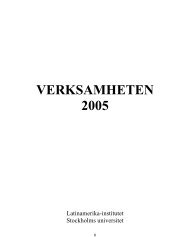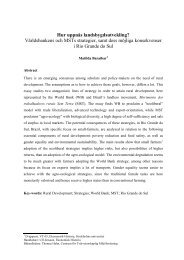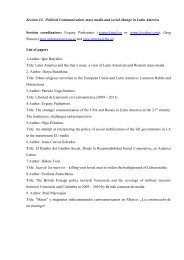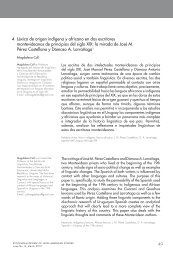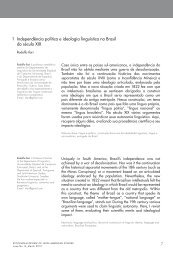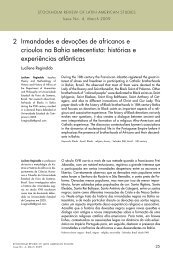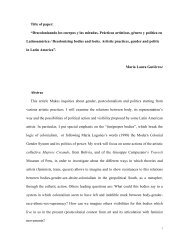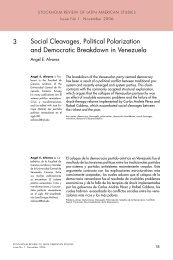Papers - Conference 2009 - Institute of Latin American Studies
Papers - Conference 2009 - Institute of Latin American Studies
Papers - Conference 2009 - Institute of Latin American Studies
Create successful ePaper yourself
Turn your PDF publications into a flip-book with our unique Google optimized e-Paper software.
<strong>of</strong>ten depend on the political will <strong>of</strong> sovereign nation-state governments. This is especiallytrue when these rights are legally non-binding (Corntassel 2007: 149).Even though questionable (some more than others), globalization provides various toolsthat can be used for empowerment. Examples are global institutions such as the UnitedNations and technological communication networks. Yet, people most in need <strong>of</strong>empowerment <strong>of</strong>ten lack many, or all, <strong>of</strong> the means needed for a realisation <strong>of</strong> empowerment.These people depend upon other actors (Word Bank 2002), which makes is hard (if notimpossible) to speak <strong>of</strong> empowerment without asking questions concerning representation andpower relations. Such questions are therefore also relevant when discussing MST and ViaCampesina as well as the larger process <strong>of</strong> globalization from below and the WSF. Accordingto some scholars these movements are nothing but partially representative for the larger wholethat they are <strong>of</strong>ten assumed to represent (Borras Jr. et al. 2008: 182-186). This statementsuggests that what is objectively seen as empowerment for “a people” may be <strong>of</strong> a morecomplex nature when understood subjectively by individuals within the group.Furthermore, empowerment needs to be understood as contextual and situational. Sincebeing human can signify different things to different individuals in different cultural, social,political and historical contexts, what empowerment implies in practice needs to beunderstood empirically. 14 Hence, what means empowerment for one individual in one specificcontext may not mean the same thing for another individual in a different context. Therefore,when discussing social movements and their strategies in relation to empowerment one needsto consider questions such as who is getting empowered, by whom, for what reason(s), andwhat does one mean with empowerment in the first place?ConclusionI have in this paper discussed two different sides <strong>of</strong> what is commonly known asglobalization. By focusing on a specific local phenomenon, The Brazilian landless ruralworker‟s movement (MST), and by placing this movement in a global framework, I havedemonstrated how local issues <strong>of</strong>ten relate to global ones and vice versa. These relations havealso proved to be rather complex.In relation to the consumption driven discursive process <strong>of</strong> globalization, also known asneo-liberalism, MST has been understood as a counter-hegemonic political actor, and as such,14 For discussions illustrative for this argumentation, see Lila Abu-Lughod 2002 and Baretti et al. 2008.9








